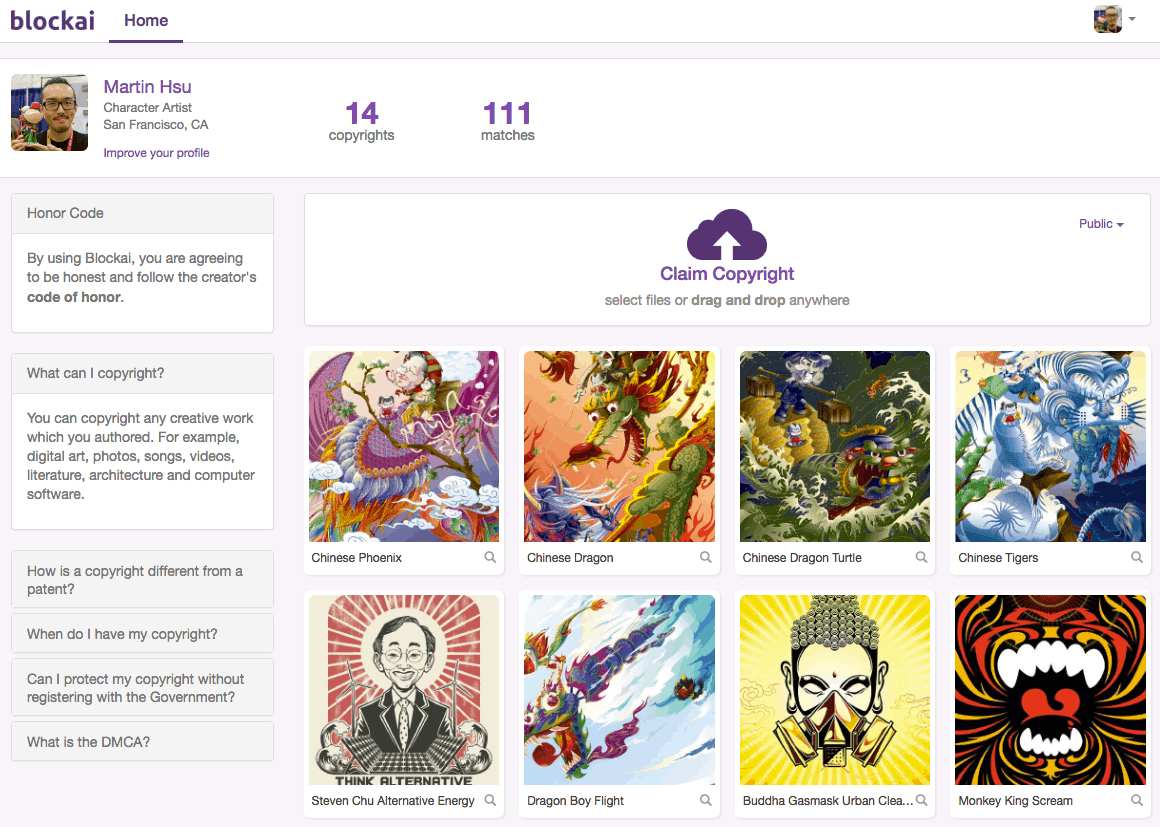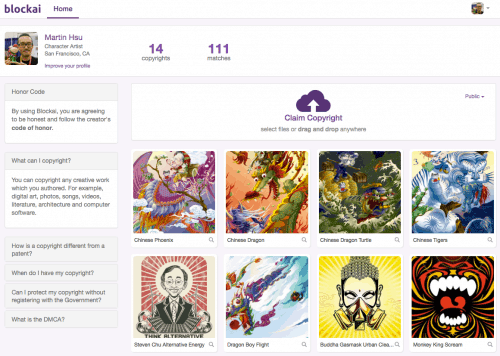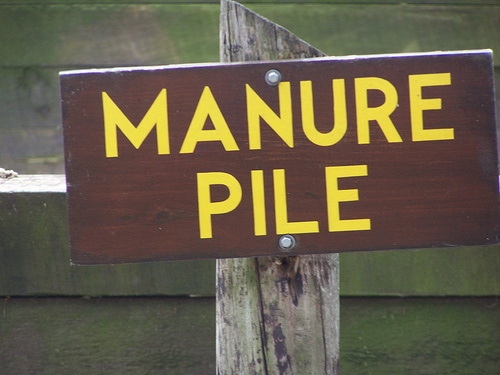Buzzword Bingo: How Binded (Blockai) Says the Blockchain Will Protect Your Copyright, and Other Nonsense

Bitcoin and other pseudo-currencies are a hot topic right now, and startups are coming up with all sorts of ways to take advantage of the buzz by launching services which use buzzwords to hide the fact that they don’t actually do anything new.

Take Binded Blockai, for example. TNW tipped me to this startup’s claims that it is using the blockchain to protect creator’s copyright.
Edit: Blockai tried to escape the bad press by changing its name.
Here’s how Binded would have you think their service works:
- Create a piece of digital art, photo or anything that can be copyrighted.
- Register your copyright on the blockchain, a public ledger powered by Bitcoin. The record is permanent and immutable.
- Receive a registration certificate with cryptographic evidence that protects your copyright. You own the certificate forever.
- Share your creation with peace of mind. You have proof of publication that protects your copyright and copyright monitoring that alerts you when people are using your work.
While that sounds nice, it’s a complete load of hooey from beginning to end.
What Binded is doing is offering a 21st-century equivalent of a "poor man’s copyright" service.
Do you know that old wive’s tale about how you can mail yourself a manuscript as a way of showing when you created a work and thus protect your copyright?
The way it’s supposed to work is that the unopened mail provides documentation as to when a work was created. But as Snopes.com, the US Copyright office, or anyone with a gram of legal knowledge will tell you, the poor man’s copyright offers exactly zero protection against infringement (Snopes points out that this may not be the case in the UK, but I wouldn’t bet on it).
The same is true for Binded, its registry service, and the misleading claims about how much "protection" their service provides.
For example, on the very first page Binded asks creators:
Do You Know Who Is Using Your Art/Photos/Designs/Cartoons?
Claim Your Copyright For Free And Find Out!
One doesn’t need to "claim" a copyright with Binded; a creator has the copyright the moment a work is created/published/fixed in a permanent form. Again, that’s copyright 101.
Further down the page Bindedclaims that:
Most artists can’t afford to register and protect their copyrights. We’re providing a free alternative.
Except this free alternative has no legal basis as a copyright registration and does not protect anyone’s copyright.
Binded’s certificate won’t do you any good if you need to send a DMCA notice to a website, and it won’t help you if you need to file a lawsuit to protect your copyright.
You can’t use that certificate to send a takedown notice, and a lawsuit will go exactly nowhere without a formal copyright registration with the US Copyright Office (this applies to the US, but not necessarily all countries).
The only thing that Binded does which might have value is that they will search the web for copies of a registered work, but you can do that on your own with any search engine or use any of a hundred online services.
Edit: And as Alan Graham pointed out to me on Twitter, Binded’s claims in this area are just as much BS as the rest of their spiel. Binded says that they offer "copyright monitoring that alerts you when people are using your work", when in reality Binded can’t catch an image when used in a Youtube video or when it’s shared via a social network (which are encrypted). So again, Binded is making promises they can’t keep.
In fact, the only noteworthy detail about Binded is that they are using the term blockchain as a buzzword. Aside from that, there is literally nothing new here.

Comments
Felix July 23, 2016 um 2:48 pm
Also, with the horror stories we hear all the time about spurious takedown notices being sent by overzealous automated systems, do we really need yet more technology to protect something that’s already enjoying more protection than is healthy?
William Ockham July 23, 2016 um 5:04 pm
The all-time champ in the category: Most Computationally Inefficient Timestamp Mechanism
Muratcan Simsek July 23, 2016 um 5:24 pm
Copyright doesn’t actually need to be registered to exist, registering just gains you a presumption. Anyway, this Blokai is not that bad, this would work as a nice proof if you don’t have money to register everything you did. Better than sending yourself a mail anyway.
But, they say that "In the U.S.A., to win money in a lawsuit you would need to have registered your copyright with the copyright office". This is wrong. This is most definitely wrong. I have no idea about actual USA law and I don’t need to; as they ratified the Berne Convention. So there is no way this could be true. Registering and protection are different things. Registering makes protection easier, but you don’t need to register if you don’t want to.
On another topic, copyright registrations work almost everywhere, no matter where you did it. Well, not everywhere but 170 or so countries are parties to the relevant the convensions.
Mike D September 15, 2017 um 7:39 am
Didn’t bother to even lookup Wiki?
https://www.copyright.gov/help/faq/faq-general.html#register
Do I have to register with your office to be protected?
No. In general, registration is voluntary. Copyright exists from the moment the work is created. You will have to register, however, if you wish to bring a lawsuit for infringement of a U.S. work. See Circular 1, Copyright Basics, section “Copyright Registration.”
Why should I register my work if copyright protection is automatic?
Registration is recommended for a number of reasons. Many choose to register their works because they wish to have the facts of their copyright on the public record and have a certificate of registration. Registered works may be eligible for statutory damages and attorney’s fees in successful litigation. Finally, if registration occurs within five years of publication, it is considered prima facie evidence in a court of law. See Circular 1, Copyright Basics, section “Copyright Registration” and Circular 38b, Highlights of Copyright Amendments Contained in the Uruguay Round Agreements Act (URAA), on non-U.S. works.
Bill Rosenblatt July 24, 2016 um 12:09 am
On the one hand, this isn’t a complete explanation of what these guys do, and it leaves out the only part that’s actually interesting. From what I can tell, Blockai is an image registry with a web-crawling copyright monitoring system based on image fingerprinting, not unlike Getty Images PicScout. It happens to use a blockchain as the mechanism for registering info about copyrighted works, but that’s not very interesting or important.
But on the other hand, the phrase "the blockchain, a public ledger powered by Bitcoin" shows that someone at this company is clueless about blockchain technology. This statement makes about as much sense as "MySql, a public database powered by the phone directory."
In reality, a blockchain is a distributed ledger, based on a body of open-source code. There are many different blockchains, created for different purposes. One of them is the Bitcoin blockchain, created to support a virtual currency. Another is Ethereum, created for supporting "smart contracts." There can be arbitrarily many, just as there can be arbitrarily many database schemes that use MySql (or Oracle or whatever).
To be charitable, I’d assume that this is just the marketing guy’s misunderstanding of what the tech guy told him (or her) – including misunderstanding of the importance of blockchain technology in this otherwise unremarkable scheme. I agree with the "Most Computationally Inefficient Timestamp Mechanism" comment above.
Alan Graham July 25, 2016 um 7:07 am
Let’s just forget for a second that any cursory examination of their marketing materials, press releases, ToS, FAQs, and blogs shows they know nothing about copyright or rights in general, and let’s just take a look at their technology. Basically this seems to be simply combining a SHA (hash) of a image file and writing that hash into the blockchain to obtain a timestamp. To keep the service free they are batch processing multiple image registrations at one time, so many registrations, small registration fee to the miners. So instead of passing on the cost to the artist, who should pay something as a cost of business, they bear the transactional miner fee and bulk all the images registered at any given point, together.
I know this because I registered two images and checked on the "proof" given. Besides getting a lovely certificate, this proves nothing. It doesn’t prove creation time or date, and it doesn’t prove publication. It doesn’t validate your identity and verify you are the owner. There are so many holes in this I could drive any number of massive vehicles through it.
This is capitalizing on hype. There’s nothing here that our team (or many others) hasn’t hacked up in a weekend a year ago. It would take Picscout all of several days to replicate this. I’m highly critical of this because the PR and news and tweets regarding this technology further spew bad information about copyright and rights and the enforcement. Plus they have a US centric view of a global issue. Not to mention, take a read through the Terms of Service…your data could be used for serving ads.
Is this really for artists, or an exit strategy for another Silicon Valley company?
Bill Rosenblatt July 24, 2016 um 8:53 am
P.S. a look at Blockai’s CEO’s obligatory Medium post (https://medium.com/@NathanLands/democratizing-copyright-5beda9a5a56) shows that he understands the difference between Bitcoin and blockchain technology in general. Blockai uses the Bitcoin blockchain, but just as a repository for copyright information, not for currency. Not only is that possible, but Blockai isn’t the first startup to use the Bitcoin blockchain for copyright applications; see also Monegraph.
Did someone say "flavor of the month"?
Is Blockchain-Powered Copyright Protection Possible? | CoinGregate August 9, 2016 um 12:14 pm
[…] an article entitled “Buzzword Bingo: How Blockai Says the Blockchain Will Protect Your Copyright and Other […]
Is Blockchain-Powered Copyright Protection Possible? – #1Bitcoin.News August 9, 2016 um 12:45 pm
[…] an article entitled “Buzzword Bingo: How Blockai Says the Blockchain Will Protect Your Copyright and […]
Is Blockchain-Powered Copyright Protection Possible? – BathurstBitcoin.com August 9, 2016 um 1:17 pm
[…] an article entitled “Buzzword Bingo: How Blockai Says the Blockchain Will Protect Your Copyright and Other […]
Is Blockchain-Powered Copyright Protection Possible? | Bani-Digitali.ro August 10, 2016 um 2:19 am
[…] an article entitled “Buzzword Bingo: How Blockai Says the Blockchain Will Protect Your Copyright and Other […]
????????????? – BlockChain.hk August 10, 2016 um 3:23 am
[…] ?????“Blockai??????????????”???????Nate Hoffelder??Blockai???????????? […]
Is Blockchain-Powered Copyright Protection Possible? | Bitcoin Trading Academy August 10, 2016 um 8:10 pm
[…] an article entitled “Buzzword Bingo: How Blockai Says the Blockchain Will Protect Your Copyright and Other […]
Blockai is a Blockchain Company With a Use – Coinjournal August 11, 2016 um 10:24 pm
[…] with your country’s copyright office. I want to state that upfront because there has been some questioning of Blockai’s usefulness. Blockai, and other “alternative” copyright companies have a […]
Is Blockchain-Powered Copyright Protection Possible? | Welcome to ValidCoin.Net August 12, 2016 um 10:54 am
[…] an article entitled “Buzzword Bingo: How Blockai Says the Blockchain Will Protect Your Copyright and Other […]
Is Blockchain-Powered Copyright Protection Possible? – Coinmonitor August 17, 2016 um 7:32 am
[…] an article entitled “Buzzword Bingo: How Blockai Says the Blockchain Will Protect Your Copyright and Other […]
Offering Bitcoin Rewards for Turning in eBook Pirates, and Other Bad Ideas | The Digital Reader September 14, 2017 um 1:18 pm
[…] dozen startup using blockchains for the most ridiculous reasons. (For example, Binded/Blockai claims that blockchain can protect creator's copyrights, even though that's simply not […]
Authors, Don't Be Taken in by the Blockchain/Bitcoin Hype | The Digital Reader June 4, 2018 um 11:16 am
[…] have written about Binded before; it offers a blockchain-based alternative to "poor man's copyright" that does absolutely nothing […]